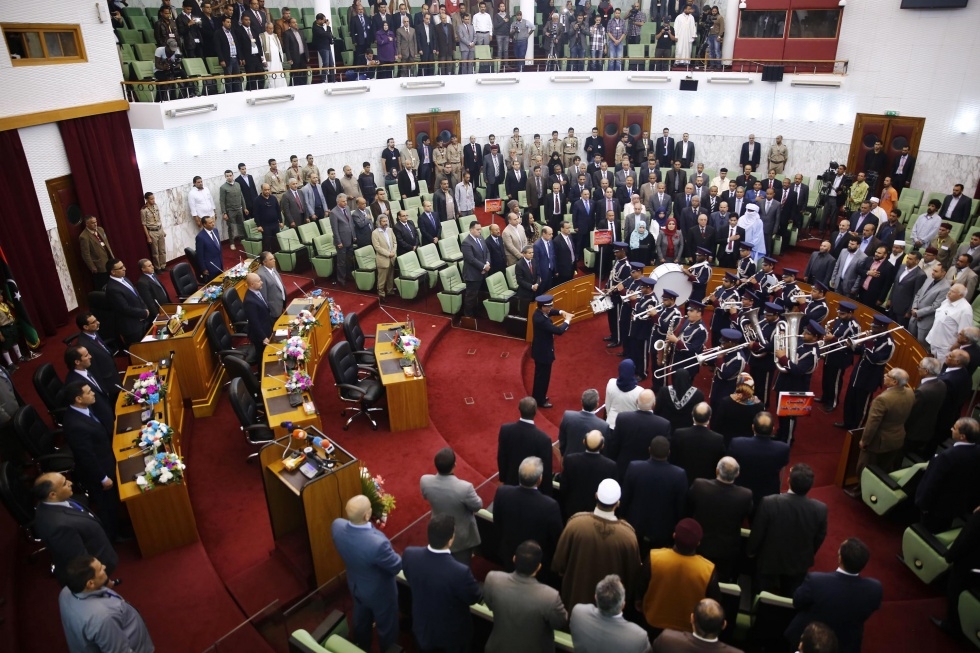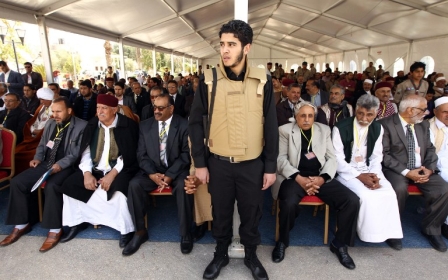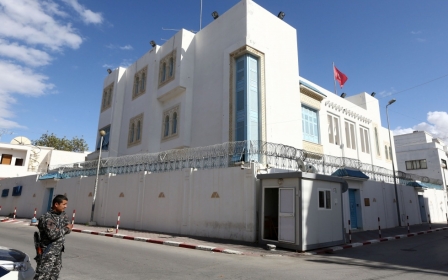Libya's assembly faces major challenges

Libya’s long awaited constitutional drafting process started on 21 April in the city of al Baida in Eastern Libya. The Constituent Assembly held its first session to start work on a set of governing bylaws and elected its presidency. According to the Temporary Constitutional Declaration, the Assembly will have 120 days to present a draft of the constitution to the General National Congress (GNC) and then put it up for a public referendum.
The Constituent Assembly faces tremendous challenges as insecurity and political polarization in the country grows out of control, and public disillusionment with political process and governing institutions in Libya. According to the official figures from the Higher National Elections Commission, only around 45 percent of registered voters participated in the elections on 20 February. This puts the net participation of eligible voters in Libya below 14 percent, which amounts to less than 10 percent of the total population; this extremely low turnout to participate in the elections is starting a debate in Libya about the legitimacy of the Constituent Assembly in charge of drafting the constitution. Ironically, the only reason for the election rather than selection of the candidates was "in theory" to vest the Constituent Assembly with added legitimacy. Fear is growing that Libya might be able to produce a constitution that looks great on paper, but one that would lack real legitimacy. For the constitution to be sustained and help Libya move on from the chaotic transition phase, Libyans must have a sense of ownership over their constitution. The boycott by ethnic minorities including the Amazigh and Tebu further undermines the constitution building process.
Ali Al-Tarhuni, an academic and long-time opponent of the Gaddafi regime was elected as President of the Constituent Assembly in its first session. Al-Tarhuni was also one of the figure heads of the Libyan rebels during the war against the Gaddafi regime and was in charge of the Finance and Oil office in the Executive Office of the National Transitional Council (NTC).
Al-Tarhuni faces a tough task to restore trust in the political process in Libya after two years of growing disillusionment among Libyans, who are frustrated with the transitional governing institutions due to infighting between political groups over narrow-minded political interests, amid a deteriorating security situation. The Constituent Assembly as a whole will have to overcome the legacy of dysfunction created by the GNC and the inability of political blocs within the GNC to put Libya’s national interests before their own. Moreover, having two elected bodies in Libya risks friction between them.
The Temporary Constitutional Declaration gives the Constituent Assembly 120 days to draft a constitution and then put it up for a public vote within 30 days. It is highly likely that the constitution drafting process will take longer than outlined in the Constitutional Declaration. For instance, there are still 12 vacant seats to fill in the Constituent Assembly. These seats remained vacant due to boycott by the Amazigh and Tebu. In addition, due to insecurity in places such as the city of Derna, where extremist groups prevent elections from taking place seats, remain vacant. The government has promised that a re-run of elections in these places will take place soon. Indeed, on 27 May, elections were held to fill five seats in southern areas of al-Kufra and al-Qatrun with results expected to be announced soon. However, the Tebu and Amazigh are still boycotting the constitutional drafting process, and the security situation in the city of Derna remains out of control with extremist groups having the upper hand. With that in mind, Libya’s politicians must prepare a mechanism to relax the drafting deadline while still demonstrating productivity so that the general public does not lose faith in the process.
Despite these enormous challenges, the Constituent Assembly has some advantages that could ensure its success in this crucial process of constitution building in post revolution Libya. The assembly is significantly smaller than the GNC in terms of the number of its members and it has a very specific mandate and task. This should significantly improve the decision-making mechanism. In addition, the assembly was elected based on individual candidate lists only. No party lists were allowed as per electoral law. This in turn could help reduce division and polarization between its members given that no political blocs are created within the assembly to cater for narrow-minded political interests and end up repeating the polarizing and divisive legacy of the GNC, where the national agenda gets lost amid political infighting.
Furthermore, the assembly needs to ensure that the constitution drafting process is as inclusive as possible. A public outreach and awareness mechanism should be in place. There has already been incredibly successful nationwide awareness campaigns about constitutional issues and the importance of participation in the constitution building process through either participation in the consultation process or the public referendum. Libyan NGOs including Lawyers for Justice conducted such awareness campaigns. The ongoing National Dialogue Initiative offers another valuable resource for the Constituent Assembly if employed effectively. Fortunately, upon his election as president of the Constituent Assembly, Al-Tarhuni urged all NGOs and civil society groups to engage with the assembly and promised a positive and constructive engagement on his part. This is an encouraging start and one that Libya’s civil society leaders and organizations must capitalize on.
There are several other big picture questions that deserve careful consideration to ensure that the process moves forward steadily and smoothly, especially considering the less than desirable security situation. Now that the assembly has been established, Libya will have two elected bodies operating simultaneously, without a clear demarcation of their areas of jurisdiction. The Constitutional Declaration lacks straightforward provisions that would help to avoid potential conflict. Conflict between these two elected bodies must be avoided. This competition and the overlapping competences of the two elected bodies could lead to brinkmanship. If these differences are not settled peacefully, they could degenerate into a contest over sovereignty that would abruptly end Libya’s experiment with constitutionalism and purported transition to democracy. Moreover, there are unanswered questions surrounding the issue of public outreach.
Even if the constitutional process succeeds and culminates in an elected constitutional government next year, if it is not paralleled by reform of the GNC or upcoming parliament, National Dialogue, and restoration of legitimacy to governing institutions, then militias and armed groups will ultimately influence the process. Under such conditions, some of the more dysfunctional aspects of the current political situation, such as Islamic finance, a rigid interpretation of Sharia law, granting overlapping powers to various regional/provincial bodies, etc., would likely be enshrined in the new document. This means that even in the positive scenario of a successfully executed transition, it is highly likely that the power of the Libyan state will be largely eviscerated and replaced by complex and feuding bodies.
Libya cannot afford a failed constitutional process, because such scenarios would result in local, regional, Islamist, and militia interests retaining permanent control over national and local politics with the keys to power being held in sub-state social structures instead of formal political institutions. Such scenarios would make the idea of zero-sum politics in Libya a permanent one. Libyans and the international community must get all stakeholders to forgo short-term gains to allow the resumption of oil production and exports, the restoration of security, and the return of foreign direct investment, which will actually benefit all parties.
-Mohamed Eljarh is a Libyan academic researcher and activist. He is also the Libya Transition blogger for Foreign Policy Magazine.
The views expressed in this article belong to the author and do not necessarily reflect the editorial policy of Middle East Eye.
Photo Caption: opening of the first session of Libya's constituent assembly in Al-Baida, eastern Libya (AFP)
Middle East Eye propose une couverture et une analyse indépendantes et incomparables du Moyen-Orient, de l’Afrique du Nord et d’autres régions du monde. Pour en savoir plus sur la reprise de ce contenu et les frais qui s’appliquent, veuillez remplir ce formulaire [en anglais]. Pour en savoir plus sur MEE, cliquez ici [en anglais].




